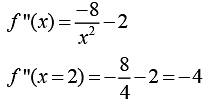Electronics and Communication Engineering (ECE) Exam > Electronics and Communication Engineering (ECE) Questions > The function f(x) = 8loge x - x2 + 3 attains...
Start Learning for Free
The function f(x) = 8loge x - x2 + 3 attains its minimum over the interval [1, e] at x = (Here loge x is the natural logarithm of x )
- a)e
- b)2
- c)(1 + e)/2
- d)1
Correct answer is option 'D'. Can you explain this answer?
Most Upvoted Answer
The function f(x) = 8loge x - x2 + 3 attains its minimum over the int...
Explanation:
To find the minimum of the function f(x) = 8loge x - x^2 over the interval [1, e], we need to find the critical points of the function and evaluate the function at those points to determine the minimum.
Finding the Critical Points:
To find the critical points, we need to find the derivative of the function f(x) and set it equal to zero.
f(x) = 8loge x - x^2
Differentiating f(x) with respect to x, we get:
f'(x) = 8(1/x) - 2x
Setting f'(x) = 0 and solving for x:
8(1/x) - 2x = 0
Multiplying through by x, we get:
8 - 2x^2 = 0
Rearranging the equation:
2x^2 = 8
x^2 = 4
Taking the square root of both sides:
x = ±2
Evaluating the Function:
Now we need to evaluate the function f(x) at the critical points and at the endpoints of the given interval [1, e].
f(1) = 8loge(1) - 1^2 = 0 - 1 = -1
f(e) = 8loge(e) - e^2 = 8(1) - e^2 = 8 - e^2
f(2) = 8loge(2) - 2^2 = 8(0.693) - 4 = 5.544 - 4 = 1.544
So, we have the following values:
f(1) = -1
f(e) = 8 - e^2
f(2) = 1.544
Comparing the Values:
To determine the minimum value of the function, we compare the values of f(x) at the critical points and endpoints.
f(1) = -1 is the smallest value among all the values obtained.
Therefore, the minimum value of the function f(x) over the interval [1, e] is at x = 1.
Hence, the correct answer is option D) 1.
To find the minimum of the function f(x) = 8loge x - x^2 over the interval [1, e], we need to find the critical points of the function and evaluate the function at those points to determine the minimum.
Finding the Critical Points:
To find the critical points, we need to find the derivative of the function f(x) and set it equal to zero.
f(x) = 8loge x - x^2
Differentiating f(x) with respect to x, we get:
f'(x) = 8(1/x) - 2x
Setting f'(x) = 0 and solving for x:
8(1/x) - 2x = 0
Multiplying through by x, we get:
8 - 2x^2 = 0
Rearranging the equation:
2x^2 = 8
x^2 = 4
Taking the square root of both sides:
x = ±2
Evaluating the Function:
Now we need to evaluate the function f(x) at the critical points and at the endpoints of the given interval [1, e].
f(1) = 8loge(1) - 1^2 = 0 - 1 = -1
f(e) = 8loge(e) - e^2 = 8(1) - e^2 = 8 - e^2
f(2) = 8loge(2) - 2^2 = 8(0.693) - 4 = 5.544 - 4 = 1.544
So, we have the following values:
f(1) = -1
f(e) = 8 - e^2
f(2) = 1.544
Comparing the Values:
To determine the minimum value of the function, we compare the values of f(x) at the critical points and endpoints.
f(1) = -1 is the smallest value among all the values obtained.
Therefore, the minimum value of the function f(x) over the interval [1, e] is at x = 1.
Hence, the correct answer is option D) 1.
Free Test
FREE
| Start Free Test |
Community Answer
The function f(x) = 8loge x - x2 + 3 attains its minimum over the int...
Method 1



Given: Function f(x) = 8loge x - x2 + 3
Differentiate above function with respect to x,

For maxima or minima,
f '(x) = 0

8/x = 2x
x2 = 4
x = ± 2
So, we take x = 2 ∈[1,e]

f "(2) < />
At x = 2 , function f (x) is maximum. Therefore, function f(x) is attains minimum in closed intervals [1, e] .
f(x)min = min { f (1), f (e)}
At x = 1 , f(1) = 8loge 1 - 1 + 3 = 0 - 1 + 3 = 2
At x =e , f(e) = 8loge e - e2 + 3
f (e) = 8 + 3 - e2
f(e) = 11 - 7.38 = 3.61
f (x)min = min{2, 3.61} = 2
We can see, that minimum value occur at point x = 1 .
Hence, the correct option is (D).
Method 2
Given function, f(x) = 8loge x - x2 + 3, x ∈ [1,e] as closed interval is given.
Checking options,
Option (A) : x = e,
f(x = e) = 8loge e - e2 + 3
f(x = e) = 8 - e2 +3 = 3.61
Option (B) : x = 2,
f (x = 2) = 8loge (2) - 22 + 3
f(x = 2) = 4.545
Option (C) : 


Option (D) : x = 1,
f(x = 1) = 8loge(1) - (1)2 + 3
f(x =1) = 8 x 0 -1+ 3 = 2
At x = 1 it shows minimum value.
Hence, the correct option is (D).

|
Explore Courses for Electronics and Communication Engineering (ECE) exam
|

|
Similar Electronics and Communication Engineering (ECE) Doubts
The function f(x) = 8loge x - x2 + 3 attains its minimum over the interval [1, e] at x = (Here loge x is the natural logarithm of x )a)eb)2c)(1 + e)/2d)1Correct answer is option 'D'. Can you explain this answer?
Question Description
The function f(x) = 8loge x - x2 + 3 attains its minimum over the interval [1, e] at x = (Here loge x is the natural logarithm of x )a)eb)2c)(1 + e)/2d)1Correct answer is option 'D'. Can you explain this answer? for Electronics and Communication Engineering (ECE) 2025 is part of Electronics and Communication Engineering (ECE) preparation. The Question and answers have been prepared according to the Electronics and Communication Engineering (ECE) exam syllabus. Information about The function f(x) = 8loge x - x2 + 3 attains its minimum over the interval [1, e] at x = (Here loge x is the natural logarithm of x )a)eb)2c)(1 + e)/2d)1Correct answer is option 'D'. Can you explain this answer? covers all topics & solutions for Electronics and Communication Engineering (ECE) 2025 Exam. Find important definitions, questions, meanings, examples, exercises and tests below for The function f(x) = 8loge x - x2 + 3 attains its minimum over the interval [1, e] at x = (Here loge x is the natural logarithm of x )a)eb)2c)(1 + e)/2d)1Correct answer is option 'D'. Can you explain this answer?.
The function f(x) = 8loge x - x2 + 3 attains its minimum over the interval [1, e] at x = (Here loge x is the natural logarithm of x )a)eb)2c)(1 + e)/2d)1Correct answer is option 'D'. Can you explain this answer? for Electronics and Communication Engineering (ECE) 2025 is part of Electronics and Communication Engineering (ECE) preparation. The Question and answers have been prepared according to the Electronics and Communication Engineering (ECE) exam syllabus. Information about The function f(x) = 8loge x - x2 + 3 attains its minimum over the interval [1, e] at x = (Here loge x is the natural logarithm of x )a)eb)2c)(1 + e)/2d)1Correct answer is option 'D'. Can you explain this answer? covers all topics & solutions for Electronics and Communication Engineering (ECE) 2025 Exam. Find important definitions, questions, meanings, examples, exercises and tests below for The function f(x) = 8loge x - x2 + 3 attains its minimum over the interval [1, e] at x = (Here loge x is the natural logarithm of x )a)eb)2c)(1 + e)/2d)1Correct answer is option 'D'. Can you explain this answer?.
Solutions for The function f(x) = 8loge x - x2 + 3 attains its minimum over the interval [1, e] at x = (Here loge x is the natural logarithm of x )a)eb)2c)(1 + e)/2d)1Correct answer is option 'D'. Can you explain this answer? in English & in Hindi are available as part of our courses for Electronics and Communication Engineering (ECE).
Download more important topics, notes, lectures and mock test series for Electronics and Communication Engineering (ECE) Exam by signing up for free.
Here you can find the meaning of The function f(x) = 8loge x - x2 + 3 attains its minimum over the interval [1, e] at x = (Here loge x is the natural logarithm of x )a)eb)2c)(1 + e)/2d)1Correct answer is option 'D'. Can you explain this answer? defined & explained in the simplest way possible. Besides giving the explanation of
The function f(x) = 8loge x - x2 + 3 attains its minimum over the interval [1, e] at x = (Here loge x is the natural logarithm of x )a)eb)2c)(1 + e)/2d)1Correct answer is option 'D'. Can you explain this answer?, a detailed solution for The function f(x) = 8loge x - x2 + 3 attains its minimum over the interval [1, e] at x = (Here loge x is the natural logarithm of x )a)eb)2c)(1 + e)/2d)1Correct answer is option 'D'. Can you explain this answer? has been provided alongside types of The function f(x) = 8loge x - x2 + 3 attains its minimum over the interval [1, e] at x = (Here loge x is the natural logarithm of x )a)eb)2c)(1 + e)/2d)1Correct answer is option 'D'. Can you explain this answer? theory, EduRev gives you an
ample number of questions to practice The function f(x) = 8loge x - x2 + 3 attains its minimum over the interval [1, e] at x = (Here loge x is the natural logarithm of x )a)eb)2c)(1 + e)/2d)1Correct answer is option 'D'. Can you explain this answer? tests, examples and also practice Electronics and Communication Engineering (ECE) tests.

|
Explore Courses for Electronics and Communication Engineering (ECE) exam
|

|
Signup for Free!
Signup to see your scores go up within 7 days! Learn & Practice with 1000+ FREE Notes, Videos & Tests.


























